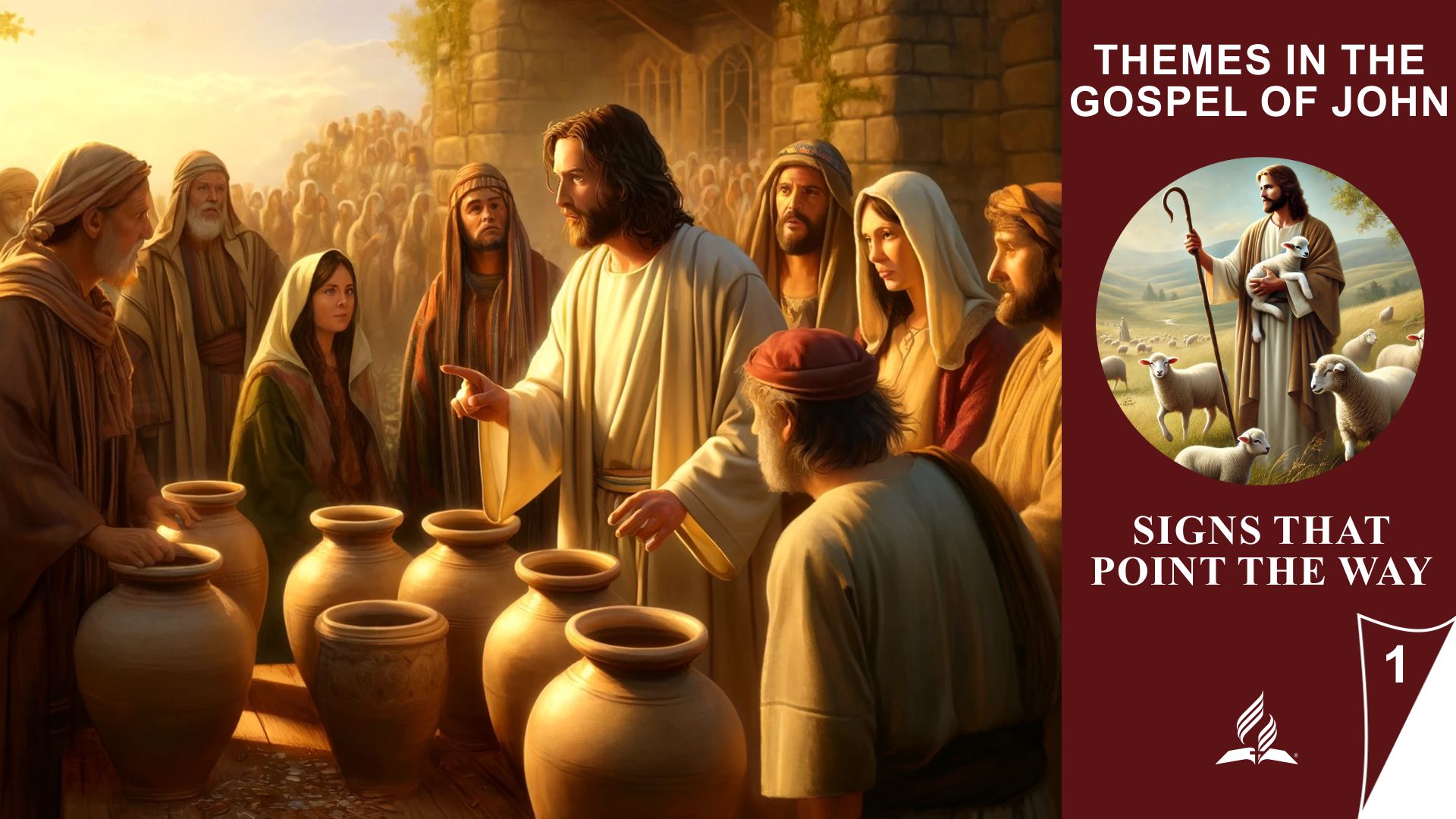

1.3 The Miracle at the Pool of Bethesda
Healing Beyond the Expected
Read John 5:1–9. Why did Jesus ask the paralyzed man if he wanted to be healed, when it was obvious that everyone at the pool wanted to be healed (John 5:6)?
In John 5:1–9, Jesus encounters a paralyzed man who is waiting at the Pool of Bethesda for healing. The people there were hoping for a miraculous stirring of the water, but the man had been sick for 38 years and was unable to get into the water in time. Jesus, knowing what was in the hearts of the people, asked the man a seemingly simple yet profound question: “Do you want to be healed?” (John 5:6).
This question shows that Jesus was not only concerned with physical healing but also with the man’s inner readiness for change. Often, a long-standing illness or life situation can become a habit, and the thought of it suddenly ending can evoke fear and uncertainty. The man was so focused on finding healing in the water that he did not realize that the true Healer was standing right before him.
Jesus did not ask the man to show faith but instead gave him a direct command: “Get up, pick up your mat, and walk!” (John 5:8). Without hesitation, the man obeyed. In that moment, his faith was revealed—not through understanding who Jesus was, but through trusting His word. It was this obedience to the word of Jesus that gave him the strength and healing he needed.
This miracle shows that God’s help often comes in ways we do not expect. While the man hoped for a solution through the water, it was Jesus who freed him from his illness. This reminds us that in our daily lives, we sometimes look for help in the wrong places, while the answer is right in front of us—in Jesus and His word.
This passage teaches us that true trust in God’s word and obedience to His guidance are necessary even when we do not immediately understand everything. Through faith in Jesus’ words, we experience the power of transformation—whether in physical or spiritual matters.
Later, Jesus met the man in the temple and said, “See, you are well! Sin no more, that nothing worse may happen to you” (John 5:14). What is the connection between illness and sin? Why must we understand that not every illness is a direct consequence of a specific sin in our lives?
The connection between illness and sin is complex and is addressed in various places in the Bible. In John 5:14, after Jesus healed the paralyzed man, He warned him: “Sin no more, that nothing worse may happen to you.” This might give the impression that there is a direct connection between his illness and his sins. However, it is important to view this relationship within the broader biblical context.
Connection Between Illness and Sin:
-
Sin and the Condition of the World: In general, illness, suffering, and death entered the world through the fall of man (Romans 5:12). When Adam and Eve sinned, the perfect conditions in which God had created humanity were disturbed. Since then, all of humanity has been exposed to the effects of sin and death, which include illness. In this sense, illness is a result of the fallen condition of the world, but not necessarily a direct punishment for individual sins.
-
Some Illnesses Can Be Consequences of Sin: In certain cases, illnesses or suffering can result from personal sins. Examples include the health consequences of poor decisions such as drug abuse, unhealthy lifestyles, or other behaviors that consciously go against God’s commandments. The Bible also contains instances where sin leads to specific consequences (e.g., Miriam’s leprosy in Numbers 12:1–15 as punishment for rebellion).
-
Not Every Illness Is the Result of Personal Sin: Jesus makes it very clear in other instances that not every illness is a direct result of personal sin. In John 9:1–3, the disciples ask if a man born blind was blind because of his own sin or his parents’ sin. Jesus replies, “Neither this man nor his parents sinned, but that the works of God might be displayed in him.” This statement shows that suffering and illness are not automatically attributed to personal guilt. Sometimes they serve to reveal God’s power and grace.
-
Sin Can Have Worse Consequences Than Illness: Jesus’ warning to the healed man to “sin no more” indicates that the spiritual consequences of sin can be more severe than physical illness. An illness may affect one’s earthly life, but sin that is not repented of and forgiven can endanger eternal life in God’s presence. Jesus wants to prevent the man from falling into a spiritual crisis that is worse than any physical ailment.
Conclusion:
While illness in a fallen world is generally a consequence of sin, this does not mean that every illness is directly related to a specific sin. The Bible encourages us to live our lives and take care of our health in accordance with God’s will, but it also teaches us that suffering and illness can sometimes affect us without being linked to personal guilt. Ultimately, Jesus’ message is an invitation to repentance and turning away from sin, in order to find not only physical healing but above all spiritual healing and life.
The encounter between Jesus and the paralyzed man at the Pool of Bethesda (John 5:1-9) offers many profound insights that are relevant both for faith and for our daily lives. Here are some thoughts on the connection between faith and our daily lives in the context of this story:
The Significance of Jesus’ Question
The question Jesus asks, “Do you want to be healed?” (John 5:6) is multifaceted. It shows that Jesus is not only interested in physical healing but also in the man’s inner readiness for change. Often, people in difficult life situations develop a habit that prevents them from seeking a real solution. The faith that Jesus expects from the man goes beyond mere hope for healing; it is an act of trust and obedience to God’s word.
Expectations of God
The paralyzed man waited for a miraculous stirring of the waters, but his healing came through Jesus’ direct intervention. This teaches us that sometimes we seek help in the wrong places, and the answers we need may be right in front of us, often in the form of God’s word or the support of others. It reminds us to be open to the ways God wants to intervene in our lives, even if they do not meet our expectations.
Connection Between Illness and Sin
Verse 14, in which Jesus tells the healed man, “Sin no more, that nothing worse may happen to you,” opens up another aspect of the relationship between illness and sin. It is important to understand that not every illness is a direct punishment for personal sins.
-
The Fallen Condition of the World: Illness and suffering are general consequences of the fall of man (Romans 5:12). They are part of the reality in a fallen world where creation is no longer perfect.
-
Consequences of Sin: In some cases, illnesses can be direct consequences of individual sins, such as unhealthy lifestyles or deliberate disregard for God’s commandments.
-
Suffering and God’s Purpose: Jesus makes it clear that suffering is not always attributable to personal guilt. Sometimes suffering serves to reveal God’s power and grace (John 9:1-3).
-
Spiritual Health: Jesus’ warning to “sin no more” indicates that the spiritual consequences of sin can be more severe than physical illnesses. True healing includes not only physical well-being but also spiritual health and a relationship with God.
Application in Daily Life
The teachings from this story encourage us to consider some basic principles in our daily lives:
-
Openness to Change: We should be ready to question our life circumstances and the issues that concern us. Are we willing to accept the changes God wants to bring into our lives?
-
Trust in God’s Word: Even when we do not immediately understand the answers, we can trust God’s promises and act in obedience, which often leads to unexpected healings or solutions.
-
Dealing with Illness and Suffering: Instead of viewing illness and suffering as punishment, we should see them as opportunities to experience God’s presence and grace in our lives.
-
Spirituality and Health: It is important to nurture both physical and spiritual health. Faith should not only express itself in hope for healing but also in a lifestyle that reflects God’s principles.
Overall, the story of the Pool of Bethesda offers deep insights into the nature of faith and healing, as well as an invitation to reflect on our lives in light of God’s word and His purposes for us.















